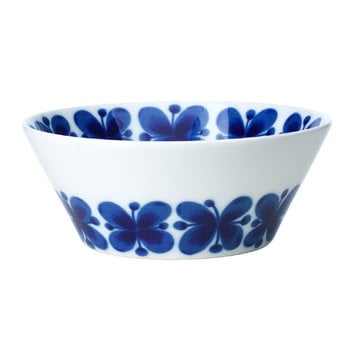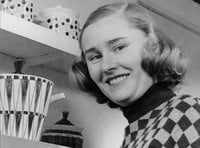Rörstrand’s Mon Amie bowl is part of Marianne Westman’s beloved tableware collection featuring blooming, delicate flowers of Nordic wetlands. Westman got the inspiration for Mon Amie collection on a rainy midsummer in the late 1940s while sitting and sketching Labrador tea flowers. The cobalt blue flowers of Mon Amie tableware have been an essential part of Scandinavian table settings since their launch in 1952, and the collection’s appearance is still crisp and fresh today. The Swedish porcelain manufacturer Rörstrand launched an updated version of the Mon Amie collection in 2008 to celebrate the 80th birthday of Marianne Westman.
Mon Amie bowl 0,6 L
Rörstrand
Description
Rörstrand’s Mon Amie bowl is part of Marianne Westman’s beloved tableware collection featuring blooming, delicate flowers of Nordic wetlands. Westman got the inspiration for Mon Amie collection on a rainy midsummer in the late 1940s while sitting and sketching Labrador tea flowers. The cobalt blue flowers of Mon Amie tableware have been an essential part of Scandinavian table settings since their launch in 1952, and the collection’s appearance is still crisp and fresh today. The Swedish porcelain manufacturer Rörstrand launched an updated version of the Mon Amie collection in 2008 to celebrate the 80th birthday of Marianne Westman.
Product details (4)
- Material
- Ceramic
- Colour
- Cobalt blue, white
- Capacity
- 0.6 l
- Care instructions
- Dishwasher and microwave safe
- Product ID
Designer
Marianne Westman (1928-2017) was a Swedish ceramic artist and textile designer who did a long career at the Swedish porcelain factory Rörstrand. Born in Falun, Sweden, Westman studied ceramic design at Stockholm’s Kostfack University College, and started her collaboration with Rörstrand already at the age of 22. Her debut was the Mon Amie tableware collection, which was released in 1952. Westman continued to work with Rörstrand until 1971, and many of her designs are today considered timeless classics of Swedish porcelain design.
View all productsReviews (1)
5
Based on 1 reviews
-
A
Anonymous
Ashburn, United States
These bowls are just as pictured. They appear well made and I look forward to using them
289 days ago
Sustainability
The Product Sustainability Framework, our criteria of sustainable design, helps you find the most sustainable products in our selection. Read below which sustainability criteria this product has met.
Working conditions & labour 8/9
-
Equal opportunities for all employees
-
Commitment to UN Global Compact, fair compensation for all employees
-
Corporate responsibility requirements defined and communicated for suppliers
-
Systematic work for improved inclusion and well-being in the workplace
-
Transparent supply chain
-
Suppliers' compliance to a code of conduct ensured
-
Compliance to the UN Guiding Principles on Business and Human Rights ensured in the supply chain
-
Support for community involvement in the supply chain
-
Direct suppliers audited and certified
Eco-friendly production 7/9
-
Fair and resource-wise water-use in production
-
No incineration or landfilling of returned items
-
No use of endangered species as materials
-
No direct environmental emissions or waste (excl. GHGs) from production
-
The sustainability of direct suppliers' production is addressed and monitored
-
Material-efficient and ecological packaging
-
Positive impact on nature’s well-being through operations that regenerate natural ecosystems
-
Production and material sourcing that respect biodiversity, animal rights, and natural ecosystems
-
No potentially harmful chemicals used in own production
Climate impact 5/8
-
Company's direct greenhouse gas emissions identified and commitment to reduction
-
Product's carbon impact identified and commitment to reduction
-
Guidance on energy- and eco-efficient use of the product
-
Contribution to climate initiatives beyond the brand’s direct operations
-
Low-carbon or compensated transportation
-
Carbon footprint of the product calculated and goals set to reduce it
-
100 % renewable energy in own production and operations
-
Carbon neutral or carbon negative product
Sustainable materials 4/6
-
Sustainable and long-lasting material choices
-
No harmful or hazardous substances
-
Responsible raw material sourcing and production
-
Ecological materials: natural, biodegradable, recyclable or recycled contents
-
Materials suited for circularity: monomaterials, recyclable finishings, renewable or recycled contents etc.
-
Outstanding materials in terms of innovativeness, responsibility, sustainability and circularity: local production or sourcing, 100 % recycled content, C2C-certification etc.
Circular design 5/5
-
High aesthetic quality promoting long-term use of the product
-
Technically durable product design and material choices
-
Design for enduring life-long quality
-
Design and support for product maintenance, repair and upgradability
-
Innovative circular design solutions: circular service system, resale platform, remanufacturing, collection of used products, etc.




